House moves to pass border funding bill without the enforcement money Trump wants

- Share via
Reporting from Washington — House Democratic leaders are scrambling to approve a bill as soon as Tuesday that would provide funding to address the humanitarian crisis at the border.
But it ignores the White House’s request for additional enforcement money, cuing up yet another fight over immigration.
House Democrats, initially torn over a $4.5-billion bill that progressives worried didn’t do enough to protect migrant children, appear to be ready to support the legislation as a first step toward responding to a near-record surge of migrants at the southern border. They are trying to act before lawmakers leave for a weeklong Fourth of July recess.
The GOP-led Senate is hoping to vote this week on a competing funding bill. The White House has already threatened to veto the House bill and favors the Senate package.
On Monday night, progressive Democrats urged Speaker Nancy Pelosi (D-San Francisco) to strengthen protections in the bill for migrant children amid growing outcry over unsanitary conditions in processing centers used for temporary holding.
Democrats plan to make changes to the legislation to address the concerns before the vote. In a closed-door meeting with rank-and-file Democrats Tuesday morning, Pelosi urged lawmakers to come together around the House bill. She said the House bill is better than the Senate’s bill, but that “to prevail, we have to have a good, strong vote.”
“A vote against this bill is a vote for Donald Trump and his inhumane ... attitude toward the children,” Pelosi said in the Tuesday meeting. At one point, she asked Democrats point-blank: “Does anyone have a problem with the bill?” She was met with silence, according to a senior Democratic aide.
The changes to the bill would require Customs and Border Protection, which runs the processing centers, to establish within 30 days health and safety protocols for children and adults in their custody. It institutes a 90-day limit for any unaccompanied child at unlicensed influx shelters and ensures access to translation services, according to House Appropriations Chairwoman Nita M. Lowey (D-N.Y).
Following reports that more than 300 children were detained in a remote Border Patrol station in Clint, Texas, and left to care for each other with insufficient food and water and unsanitary conditions, Rep. Veronica Escobar (D-Texas) said Monday the U.S. government had removed most of the children, with roughly 30 remaining.
But a Customs and Border Protection official confirmed to The Times on Tuesday that 127 of the migrant children transferred from the Clint station were subsequently moved back.
When asked why the children had been returned, the official said it was “because the numbers have been reduced and [the Department of Health and Human Services Office of Refugee Resettlement] was able to take a number of them.”
The Senate is rushing to schedule a vote on its version of the border supplemental bill to pressure House Democrats, but Senate Democrats indicated Tuesday they’re pushing for similar changes to the upper chamber’s measure as well to address the widening scandal over detention conditions. A bipartisan version of the bill was already approved by a committee.
“Children ripped away from their parents, kept in cages, denied nutrition, hygiene, diapers, toothbrushes,” Minority Leader Charles E. Schumer (D-N.Y.) said on the Senate floor. “How can our country do this? And all because some in the president’s purview think that might deter immigrants.”
In a veto threat, the White House warned that the House bill lacked funding for additional beds and had no funding for border security. Because of the White House’s opposition, many Republican lawmakers also oppose the House bill.
It’s unclear whether any legislation will be sent to President Trump’s desk before Congress leaves town — or whether he’d sign it.
In May, the White House asked for $4.5 billion in emergency funding to address the surge at the border. But while the administration billed the request as primarily to address humanitarian needs, Democrats and other critics said the majority of funds would have been used to increase capacity to hold and detain migrants and support border enforcement operations.
More to Read
Get the L.A. Times Politics newsletter
Deeply reported insights into legislation, politics and policy from Sacramento, Washington and beyond. In your inbox twice per week.
You may occasionally receive promotional content from the Los Angeles Times.










